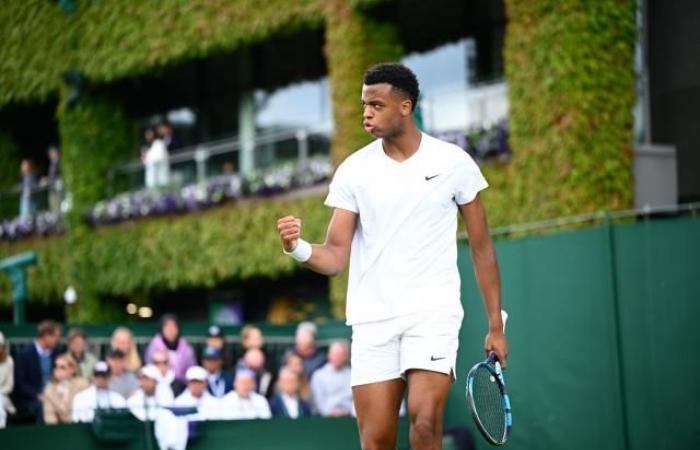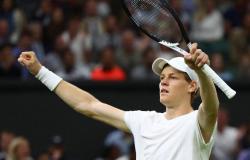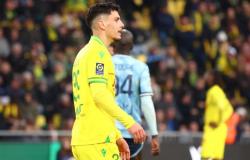
“You came out on top after an intense fight against Sebastian Korda on Tuesday, where you had to deal with interruptions due to rain. Was it hard to manage the wait?
I’m starting to get used to it, because since Roland, I have the impression that all my matches have been interrupted. (smile). It’s complicated, sometimes, to deal with this kind of thing. Sometimes, the court was slippery, almost playable, but I knew how to stay calm, focused, that was the most important thing. It worked for me. I think I handled the situation well.
And at the end, this victory in five rounds…
This is the first! I lost in five sets at Roland last year, same this year, I said to myself: “Will I win a Grand Slam match?” It feels good. Especially against an opponent like that, on this surface, and as a lucky loser. It’s almost the victory that does me the most good, this year.
“I try to put this pressure from the first point to give the right temperature to the match. And I try to see when the opponents become feverish”
Against Korda, you scored almost a hundred points with a single stroke of the racket, between the 51 aces and almost as many service winners. Is it easy to get all that, when you are more than two meters tall?
It’s not easy to serve, otherwise everyone would be strong (laugh). Of course, when you’re tall, it helps, but if you don’t have good technique, if you haven’t worked in training, if you haven’t spent hours and hours on the basket, you’re not going to be able to serve many aces in a match. The guys return very well, so you have to be more and more precise. I can’t rely on that all the time, because they’re all starting to return better. The balls are a little heavier, the surfaces a little slower, there are returns that are long and then you still have to have a strong enough basic game to make the difference. But of course, I’m happy to have this serve which helps me enormously. On break points, I stay calm, I don’t think about the ace or the winning serve. If I make one, so much the better. If the ball comes back, well, I’ll have to figure it out, but I don’t put pressure on myself by telling myself that I absolutely have to make an ace.
You made an impression by serving two aces in a row, including one on the second serve, when Korda was leading 6-5 in the third set tie-break. How did you do it?
I close my eyes, I hit hard and I tell myself that it will go in (laugh). No, I have my zone in mind, and then, at 6-6, on the second serve, it may not be visible, but there is a bit of scratching (effect) inside and it’s a shot that I can control, in quotes, even if it goes off quite quickly and it’s quite impressive. But I wanted to do a little second at 160 (km/h). I didn’t want to make the ace at the T, but I have to go for it, I know that I have less chance if I don’t commit. If I had made a double fault, I would have been told: “Yeah, what a jerk to try that!” But when it works, everyone is impressed, and I was ready to take responsibility for that choice. I said to myself: “Come on, go ahead, put everything you have into the ball and try to be as precise as possible.” That’s an ace, so much the better.
Your game also produces a lot of frustration in the opponent. Is there a form of psychological combat? Did you see that Korda was getting discouraged at times?
I try to focus only on myself, but it’s important to be able to feel what’s happening when the opponent is frustrated, when it’s time to make him play a little more, when you have to put pressure on him. I try to put it, this pressure, from the first point, to give the right temperature to the match. And I try to see when the opponents become feverish, even if I keep the same game plan. I saw that he didn’t really like it, so I kept trying. Besides, when I finally break him, in the fifth, at 1-0, I think I’m reaping the fruits of what I’ve sown since the beginning of the match, by putting this pressure on, on the return.
“It’s often difficult to change things, especially when you’re a tennis player, you’re so afraid of change… But you have to change to be able to succeed, otherwise there are stages that you won’t take.”
John Mpetshi Perricard
You are coached by Emmanuel Planque, who had already brought quite a few other players into the top 100 before you. How important is his role?
When I started with Manu, he let me do it a bit. He wanted to see how I played, we didn’t know each other very well. There was a lot of work, it was a big project. There were a lot of discussions. In tournaments, after matches, after training… Things had to change, because I didn’t have the right vision of (mon) game, I didn’t see how I was going to play in a few years, I didn’t really see my weapons, I thought I was going to make the game with my forehand, when no (laugh). Or maybe more to hurt. Having a coach like that, who really does his job, who looks here and there to see if he can’t scratch out little things, who suggests correcting certain shortcomings, it helps a lot. Often, it’s difficult to change things, especially when you’re a tennis player, you’re so afraid of change… But you have to change to be able to succeed, otherwise there are steps you won’t take.
And what is the secret of your service? Have you observed a lot of the great servers who preceded you on the circuit? Which one in particular?
None. I didn’t really copy a server, I have my style, my routine before each serve. I don’t take the ball on the rise like Isner, I don’t throw the ball three meters high like Del Potro, no, I’ve always had Giovanni Mpetshi’s serve. It’s mine. I serve like me (laugh). »





